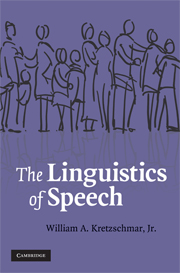Book contents
- Frontmatter
- Contents
- List of figures
- List of tables
- Acknowledgments
- The road not taken
- Introduction
- 1 The contemporary marketplace of ideas about language
- 2 Saussure
- 3 Evidence from linguistic survey research: basic description
- 4 Statistical evidence from linguistic survey research
- 5 Evidence from corpus linguistics
- 6 Speech as a complex system
- 7 Speech perception
- 8 Speech models and applications
- References
- Index
8 - Speech models and applications
Published online by Cambridge University Press: 03 July 2009
- Frontmatter
- Contents
- List of figures
- List of tables
- Acknowledgments
- The road not taken
- Introduction
- 1 The contemporary marketplace of ideas about language
- 2 Saussure
- 3 Evidence from linguistic survey research: basic description
- 4 Statistical evidence from linguistic survey research
- 5 Evidence from corpus linguistics
- 6 Speech as a complex system
- 7 Speech perception
- 8 Speech models and applications
- References
- Index
Summary
At the turn of the last century Saussure made the choice that he had to make when he elected to focus on the linguistics of linguistic structure over the linguistics of speech. He had no effective means to cope with the problems presented by speech, and the study of language per se deserved its own place in academia rather than just serving as ancilla to so many other worthy social disciplines. Times have changed. The study of language still deserves its own place among the academic disciplines, but we now have the means to work effectively with speech. We can record it, we can manage great volumes of it on computers, and we can process what we record and manage with modern statistics to assess its dynamics. In the preceding chapters, it is clear that we get results when we do study speech on its own terms. We have no reason to abandon the linguistics of linguistic structure, but we now have every reason to establish the linguistics of speech, not just because we now can but because we ought to, at least in order to clarify the relationship of linguistic structure to its empirical base, a relationship that all agree it must have. Saussure said as much ((1916)1986: 19):
speech . . . is necessary in order that a language may be established. Historically, speech always takes precedence. How would we ever come to associate an idea with a verbal sound pattern, if we did not first of all grasp this association in an act of speech? Furthermore, it is by listening to others that we learn our native language. A language accumulates in our brain only as the result of countless experiences. Finally, it is speech which causes a language to evolve. The impressions received from listening to others modify our own linguistic habits.
- Type
- Chapter
- Information
- The Linguistics of Speech , pp. 251 - 277Publisher: Cambridge University PressPrint publication year: 2009

